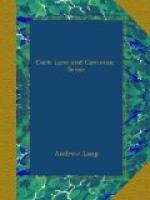In three pages Dr. Carpenter has shown that ’early scientific training’ in physiology and pathology, does not necessarily enable its possessor to state a case fully. Nor does it prompt him to discriminate between rumours coming, a hundred and fifty years after the date of the alleged occurrences, from a remote, credulous, and unscientific age: and the statements of witnesses all living, all honourable, and, in one case, of ‘high scientific attainments.’ {327}
It is this solemn belief in his own infallibility as a judge of evidence combined with his almost incredible ignorance of what evidence is, that makes Dr. Carpenter such an amusing controversialist.
If any piece of fact is to be proved, it is plain that the concurrent testimony of three living and honourable men is worth more than a bit of gossip, which, after filtering through a century or two, is reported by an early Christian Father. In matters wholly marvellous, like Home’s flight in the air, the evidence of three living and honourable men need not, of course, convince us of the fact. But this evidence is in itself a fact to be considered—’Why do these gentlemen tell this tale?’ we ask; but Dr. Carpenter puts the testimony on the level of patristic tattle many centuries old, written down, on no authority, long after the event. Yet the worthy doctor calmly talks about ’want of scientific culture preventing people from appreciating the force of scientific reasoning,’ and that after giving such examples of ‘scientific reasoning’ as we have examined. {328} It is in this way that Science makes herself disliked. By aid of ordinary intelligence, and of an ordinary classical education, every one (however uncultivated in ‘science’) can satisfy himself that Dr. Carpenter argued at random. Yet we do not assert that ‘early scientific training’ prevents people from understanding the nature of evidence. Dr. Carpenter had the training, but he was impetuous, and under a dominant idea, so he blundered along.
Dr. Carpenter frequently invoked for the explanation of marvels, a cause which is vera causa, expectancy. ’The expectation of a certain result is often enough to produce it’ (p. 12). This he proves by cases of hypnotised patients who did, or suffered, what they expected to be ordered to suffer or do, though no such order was really given to them. Again (p. 40) he urges that imaginative people, who sit for a couple of hours, ‘especially if in the dark,’ believing or hoping to see a human body, or a table, rise in the air, probably ’pass into a state which is neither sleeping nor waking, but between the two, in which they see, hear, or feel by touch, anything they have been led to expect will present itself.’
This is, indeed, highly probable. But we must suppose that all present fall into this ambiguous state, described of old by Porphyry. One waking spectator who sees nothing would make the statements of the others even more worthless than usual. And it is certain that it is not even pretended that all, always, see the same phenomena.




